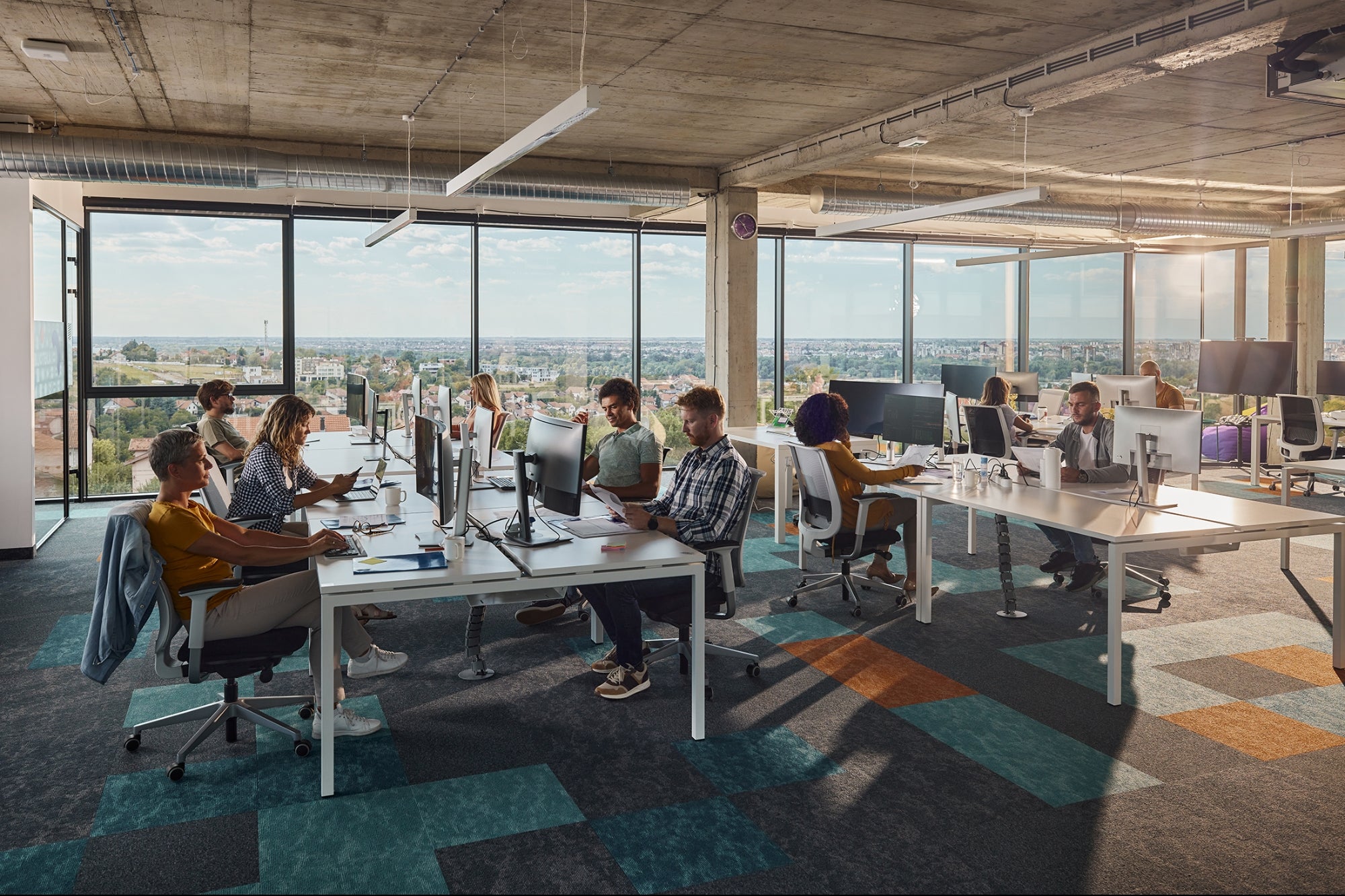Good. Keep it up, everyone. Flexibility in working from home is golden. The vast majority of office work does not need to be in person.
Indeed, you couldn’t pay me enough to go back to the office at this point. Also, imagine the amount of cars this removes from the road each and every day.
Funny enough, I’m sure as a net you’re absolutely right but for my family personally it actually means we have to drive more. We have to make two round trips into town each day for my son’s daycare, as opposed to just dropping him off on the way to work and picking him up, so we went from about 30 miles a day driven to about 60. But on the days that my wife’s in the office she can do exactly that.
But yeah, I agree, I would need a MASSIVE raise to consider going back to an office full time. Enough to pay a housekeeper, eat out every day, and cover the added wear and tear on the car, plus parking, etc. I’m saving a fortune by staying home every day, and it’s done wonders for my mental health.
I do miss the collaboration aspect, but I can charge my social batteries on weekly lunch zoom calls with my friends
Unfortunately, North America suffers from terrible city planning. It never ceases to amaze me that it’s practically impossible to get around without a car in so many places in US and Canada. I grew up in USSR, and everything was organized using microdistricts which were designed so that you had everything you needed within walking distance, and most of the time you didn’t even need to use public transit to get around. It’s one of the things I miss the most living in Canada nowadays.
And I agree that in person collab can be smoother, but zoom is a decent trade off. also find you get interrupted less with remote work. When people are in the office it’s really easy to just pop up somebody’s cubicle.
Yeah, I agree, but I also kind of like it? I know it goes against a lot of popular opinion online, and obviously it’s annoying that I have to drive 5 minutes to get to a grocery store or 15 to drop my kid off, but my neighborhood is cut into the middle of the woods so we’re secluded and we get to see lots of wilderness around us. But our houses are close together so we’re all really friendly with each other and have a great community where it feels totally safe to let the kids play outside until far after dark.
It also helps that I love driving, and I specifically love my car, so even though I’ve driven 20K miles / 32K km in the past year, it doesn’t feel like much time wasted because I’ve loved doing it
It’s a different approach for sure. Back in USSR we had dense housing, but it was surrounded by lots of parks, so there was a lot of nature to enjoy as well. And it was definitely safer than anything I’ve experienced in the west. People would let their kids out to play completely unsupervised, and you’d have seniors go to the park in the evening. The idea of being mugged wasn’t even something anyone could imagine.
I do miss the collaboration aspect, but I can charge my social batteries on weekly lunch zoom calls with my friends
IMO this is a big part of why companies are pushing return to work, even if employees hate it. They want the lunch conversation and collaboration to be with other company employees. They want to make sure that if someone has a really cool new idea, that the idea is owned by the company. They don’t want the employee to leave to start a company with their friends instead.
If your entire social life is on the Google / Facebook / Apple campus, then any ideas you have are likely to be owned by the company too.
If you work from home, take breaks IRL or online with your friends, etc. then you’re less tied to the company. You don’t even necessarily need to quit to form a new company. You could even start one while working at your day job, as long as your performance doesn’t suffer.
Yeah, it makes perfect sense from the perspective of the company. I just disagree with its value as an employee
I was one of those people who turned over thanks to return to office. In the two years between the start of the pandemic and when RTO happened at my company, I bought a house (which requires upkeep), moved farther away from the office (from 5 miles away to 20), and had a kid.
Once you taste the freedom of being able to do laundry, wash the dishes, mow the lawn, etc., with the free time you’re saving by not having to commute, it’s really hard to give it up.
Likewise, my wife switched from a full time in-person job to a full remote job which eventually turned into a 2 days per week in office, then 3, job, and it’s getting harder and harder to manage. We’re hoping she can change departments within the company to a team that’s full remote.
I genuinely don’t know how people made it work with kids before. If I was spending an extra 3 hours a day “on the clock” (but not getting paid for those) commuting, taking an unpaid lunch, etc., I literally wouldn’t have a single minute to engage with my hobbies or hang out with my wife, my house would be a mess, and more.
My company got rid of their main office and we are never going back to full in-office. And it’s one of the reasons I’m not looking at offers from other companies. I’m happy, and my team is happy.
We haven’t gotten rid of our main office quite yet (we just signed a 5 year lease in October '19, talk about timing), but we got rid of the satellite office and are absolutely recruiting in remote-first fashion. I fully expect us to just not have an office (or, at least, significantly downsize) once that lease is up.
It’s a pity. That office was such a huge upgrade from the old one, but given the events of the last 3.25 years, I’m not going to miss it that much.
And almost a third (29%) of companies enforcing office returns are struggling with recruitment. Imagine that — nearly half!
29% is almost a third, which is nearly half, which if we round up from there is 100%!
Don’t disagree with the article’s sentiment, this statement was just absurd to me lol. 29% is definitely not “nearly half”
The “nearly half” remark is referring to the previous sentence regarding 42% attrition. The paragraph could have been structured better, and I wouldn’t say “nearly half” until the 46% mark or so, but it isn’t as bad as “29% == half”.
Although I lead a team of 20 whose job requires them to physically attend, I agree that WfH is here to stay and only will expand. Smarter companies and investors should divest themselves of real estate holdings.
My tin foil hat belief is that this is the real reason so many companies are still pushing RTO. The board members and C-suite are bag-holders of corporate real estate and they’re trying to hold back the tide that’s going to tank their investments.
I’m quite sure this is correct. Real estate has always been a safe corporate investment and they are fearful.
I was fired over refusing to come to the office. I only have two words for them:

I can emphasize with both. As someone who manages a team my job has become more difficult. It is harder to engage with people and also to navigate corp politics, as networking became less easy. Where you just used to have a coffee with someone (to get to know them, talk in a more relaxed setting), now I’ll schedule a meeting.
And I have to schedule it, as it is really hit and miss if someone is available. A scheduled meeting is… Different. It feels official, purposeful. People avoid doing it unless absolutely necessary. The amount of times I have to remind them to talk with each other, and involve person X and Y in the discussion, is amazing. It’s like there is a huge barrier to click the call button on zoom. It’s like an intrusion to someone’s home.
Which it is. There is something less social about calling someone up and self inserting into their day in their home. When in office this doesn’t matter, we’re in a public setting. The only thing that suffers may be productivity, but what suffers now, I don’t know. Maybe the interaction they’re currently having with their kid.
Now, personally I love working from home. Just getting back the 2hrs per day of commute is awesome. I can schedule my day the way I want. So I’d agree it would be a hard sell to go back full-time, even if it would make aspects of my job easier.
So I decided on 1 office day every 2 weeks. It is workable, and I can tell may people are starved for physical interaction. Noone gets much actual work done that day, everyone just talks with each other, goes to the whiteboard to explain stuff etc. It’s like an outlet. And it gives me an argument in front of senior management why it’s a bad idea to outsource our jobs to a 3rd world country.
So yeah bottom line: you may not actually always want full remote. The next step after selling their office space, is outsourcing your job to a cheaper country. That may or may not work as they expect, but they’ll try anyway and you know it. If you’re remote, you’re not an actual person to the decision makers, just a number on a balance sheet. A number that’s too big.








